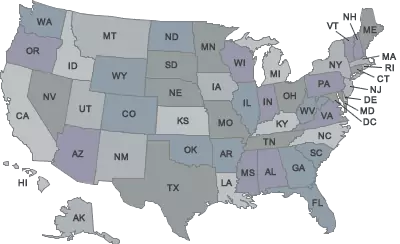Related Posts
Featured Packages
How to Perform a Non-Denominational Wedding with Open Ministry

How to Register and Perform a Wedding in Every State
Are you an ordained minister with Open Ministry and ready to perform a wedding, but unsure about the specific requirements for each state? Don't worry, we've got you covered! In this blog post, we'll provide an overview of the requirements for registering and performing a wedding in every state in the United States.
Before we dive in, it's important to note that the specific requirements can vary by state and can change over time. We recommend checking the most up-to-date information on the state's official website or with the appropriate authorities.
Here's a general overview of the requirements for registering and performing a wedding in each state:
- Alabama: To perform a wedding in Alabama, you must first obtain a marriage license from the probate court. Then, you can perform the wedding ceremony, which must be witnessed by two people and signed by the couple and the minister.
- Alaska: In Alaska, you must obtain a marriage license from the marriage license bureau and have the ceremony performed by an authorized minister. The ceremony must be witnessed by at least two people.
- Arizona: To perform a wedding in Arizona, you must first obtain a marriage license from the county recorder. Then, you can perform the wedding ceremony, which must be witnessed by at least two people.
- Arkansas: In Arkansas, you must obtain a marriage license from the county clerk and have the ceremony performed by an authorized minister. The ceremony must be witnessed by at least two people.
- California: To perform a wedding in California, you must first obtain a marriage license from the county clerk. Then, you can perform the wedding ceremony, which must be witnessed by at least two people.
- Colorado: In Colorado, you must obtain a marriage license from the county clerk and have the ceremony performed by an authorized minister. The ceremony must be witnessed by at least two people.
- Connecticut: To perform a wedding in Connecticut, you must first obtain a marriage license from the town clerk. Then, you can perform the wedding ceremony, which must be witnessed by at least two people.
- Delaware: In Delaware, you must obtain a marriage license from the county clerk and have the ceremony performed by an authorized minister. The ceremony must be witnessed by at least two people.
- Florida: In Florida, you must obtain a marriage license from the county clerk and have the ceremony performed by an authorized minister. The ceremony must be witnessed by at least two people.
- Georgia: To perform a wedding in Georgia, you must first obtain a marriage license from the probate court. Then, you can perform the wedding ceremony, which must be witnessed by at least two people and signed by the couple and the minister.
- Hawaii: In Hawaii, you must obtain a marriage license from the department of health and have the ceremony performed by an authorized minister. The ceremony must be witnessed by at least two people.
- Idaho: To perform a wedding in Idaho, you must first obtain a marriage license from the county clerk. Then, you can perform the wedding ceremony, which must be witnessed by at least two people.
- Washington D.C.: In Washington D.C., you must obtain a marriage license from the Marriage Bureau and have the ceremony performed by an authorized minister. The ceremony must be witnessed by at least two people.
- West Virginia: To perform a wedding in West Virginia, you must first obtain a marriage license from the county clerk. Then, you can perform the wedding ceremony, which must be witnessed by at least two people.
- Wisconsin: In Wisconsin, you must obtain a marriage license from the county clerk and have the ceremony performed by an authorized minister. The ceremony must be witnessed by at least two people.
- Wyoming: To perform a wedding in Wyoming, you must first obtain a marriage license from the county clerk. Then, you can perform the wedding ceremony, which must be witnessed by at least two people.
- Illinois: In Illinois, you must obtain a marriage license from the county clerk and have the ceremony performed by an authorized minister. The ceremony must be witnessed by at least two people.
- Indiana: To perform a wedding in Indiana, you must first obtain a marriage license from the county clerk. Then, you can perform the wedding ceremony, which must be witnessed by at least two people.
- Iowa: In Iowa, you must obtain a marriage license from the county recorder and have the ceremony performed by an authorized minister. The ceremony must be witnessed by at least two people.
- Kansas: To perform a wedding in Kansas, you must first obtain a marriage license from the county clerk. Then, you can perform the wedding ceremony, which must be witnessed by at least two people.
- Kentucky: In Kentucky, you must obtain a marriage license from the county clerk and have the ceremony performed by an authorized minister. The ceremony must be witnessed by at least two people.
- Louisiana: To perform a wedding in Louisiana, you must first obtain a marriage license from the clerk of court. Then, you can perform the wedding ceremony, which must be witnessed by at least two people.
- Maine: In Maine, you must obtain a marriage license from the town clerk and have the ceremony performed by an authorized minister. The ceremony must be witnessed by at least two people.
- Maryland: To perform a wedding in Maryland, you must first obtain a marriage license from the clerk of the circuit court. Then, you can perform the wedding ceremony, which must be witnessed by at least two people.
- Massachusetts: In Massachusetts, you must obtain a marriage license from the city or town clerk and have the ceremony performed by an authorized minister. The ceremony must be witnessed by at least two people.
- Michigan: To perform a wedding in Michigan, you must first obtain a marriage license from the county clerk. Then, you can perform the wedding ceremony, which must be witnessed by at least two people.
- Minnesota: In Minnesota, you must obtain a marriage license from the county clerk and have the ceremony performed by an authorized minister. The ceremony must be witnessed by at least two people.
- Mississippi: To perform a wedding in Mississippi, you must first obtain a marriage license from the circuit court. Then, you can perform the wedding ceremony, which must be witnessed by at least two people.
- Missouri: In Missouri, you must obtain a marriage license from the circuit court and have the ceremony performed by an authorized minister. The ceremony must be witnessed by at least two people.
- Montana: To perform a wedding in Montana, you must first obtain a marriage license from the county clerk. Then, you can perform the wedding ceremony, which must be witnessed by at least two people.
- Nebraska: In Nebraska, you must obtain a marriage license from the county clerk and have the ceremony performed by an authorized minister. The ceremony must be witnessed by at least two people.
- Nevada: To perform a wedding in Nevada, you must first obtain a marriage license from the county clerk. Then, you can perform the wedding ceremony, which must be witnessed by at least one person.
- New Hampshire: In New Hampshire, you must obtain a marriage license from the town or city clerk and have the ceremony performed by an authorized minister. The ceremony must be witnessed by at least one person.
- New Jersey: To perform a wedding in New Jersey, you must first obtain a marriage license from the municipality clerk. Then, you can perform the wedding ceremony, which must be witnessed by at least two people.
- New Mexico: In New Mexico, you must obtain a marriage license from the county clerk and have the ceremony performed by an authorized minister. The ceremony must be witnessed by at least two people.
- New York: To perform a wedding in New York, you must first obtain a marriage license from the city or town clerk. Then, you can perform the wedding ceremony, which must be witnessed by at least one person.
- North Carolina: In North Carolina, you must obtain a marriage license from the register of deeds and have the ceremony performed by an authorized minister. The ceremony must be witnessed by at least two people.
- North Dakota: To perform a wedding in North Dakota, you must first obtain a marriage license from the county clerk. Then, you can perform the wedding ceremony, which must be witnessed by at least two people.
- Ohio: In Ohio, you must obtain a marriage license from the probate court and have the ceremony performed by an authorized minister. The ceremony must be witnessed by at least two people.
- Oklahoma: To perform a wedding in Oklahoma, you must first obtain a marriage license from the court clerk. Then, you can perform the wedding ceremony, which must be witnessed by at least two people.
- Oregon: In Oregon, you must obtain a marriage license from the county clerk and have the ceremony performed by an authorized minister. The ceremony must be witnessed by at least two people.
- Pennsylvania: To perform a wedding in Pennsylvania, you must first obtain a marriage license from the county clerk. Then, you can perform the wedding ceremony, which must be witnessed by at least two people.
- Rhode Island: In Rhode Island, you must obtain a marriage license from the city or town clerk and have the ceremony performed by an authorized minister. The ceremony must be witnessed by at least two people.
- South Carolina: To perform a wedding in South Carolina, you must first obtain a marriage license from the probate court. Then, you can perform the wedding ceremony, which must be witnessed by at least two people.
- South Dakota: In South Dakota, you must obtain a marriage license from the county clerk and have the ceremony performed by an authorized minister. The ceremony must be witnessed by at least two people.
- Tennessee: To perform a wedding in Tennessee, you must first obtain a marriage license from the county clerk. Then, you can perform the wedding ceremony, which must be witnessed by at least two people.
- Texas: In Texas, you must obtain a marriage license from the county clerk and have the ceremony performed by an authorized minister. The ceremony must be witnessed by at least two people.
- Utah: To perform a wedding in Utah, you must first obtain a marriage license from the county clerk. Then, you can perform the wedding ceremony, which must be witnessed by at least two people.
- Vermont: In Vermont, you must obtain a marriage license from the town clerk and have the ceremony performed by an authorized minister. The ceremony must be witnessed by at least two people.
- Virginia: To perform a wedding in Virginia, you must first obtain a marriage license from the circuit court. Then, you can perform the wedding ceremony, which must be witnessed by at least two people.
- Washington: In Washington, you must obtain a marriage license from the county auditor and have the ceremony performed by an authorized minister. The ceremony must be witnessed by at least two people.
- West Virginia: To perform a wedding in West Virginia, you must first obtain a marriage license from the county clerk. Then, you can perform the wedding ceremony, which must be witnessed by at least two people.
- Wisconsin: In Wisconsin, you must obtain a marriage license from the county clerk and have the ceremony performed by an authorized minister. The ceremony must be witnessed by at least two people.
- Wyoming: To perform a wedding in Wyoming, you must first obtain a marriage license from the county clerk. Then, you can perform the wedding ceremony, which must be witnessed by at least two people.
In conclusion, registering and performing a wedding in each state in the United States can vary in terms of requirements and procedures. As an ordained minister with Open Ministry, it's important to research and understand the specific laws and regulations in each state where you plan to perform a wedding. By following the guidelines and requirements, you can help the couple celebrate their love and commitment in a meaningful and legally recognized way.



